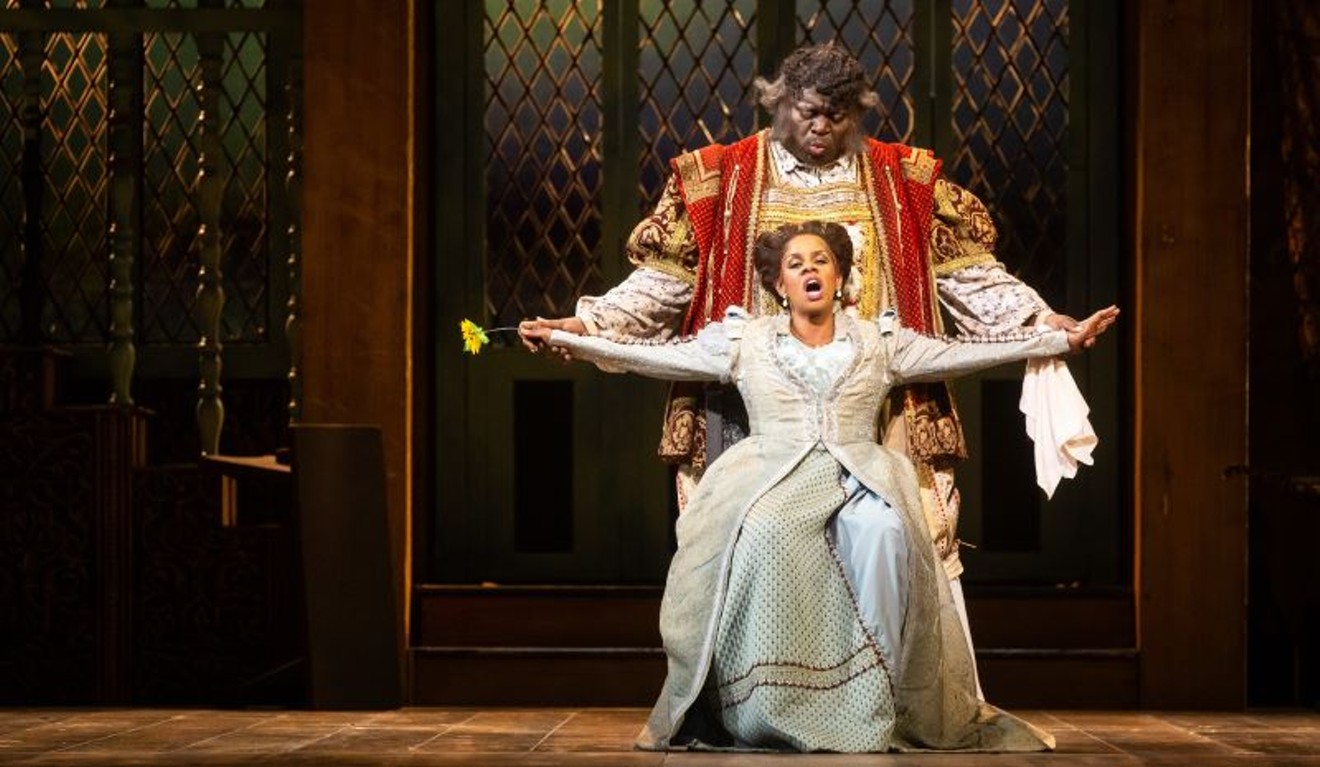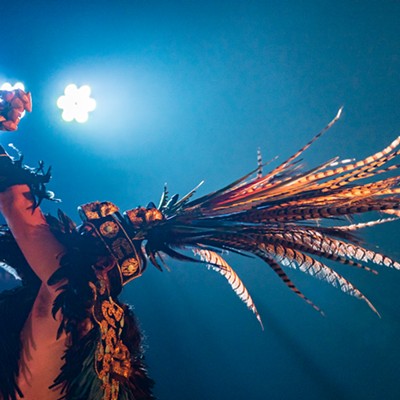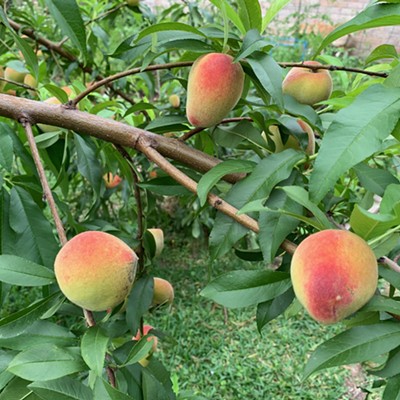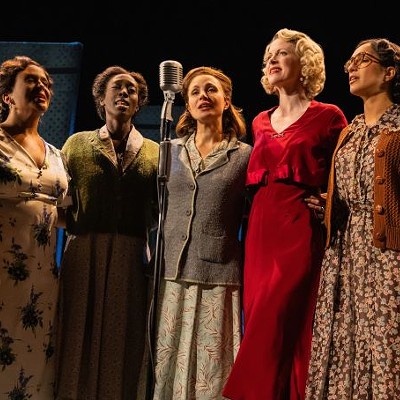Support Us
Houston's independent source of
local news and culture
account
- Welcome,
Insider - Login
- My Account
- My Newsletters
- Contribute
- Contact Us
- Sign out

Reginald Smith. Jr. and Nicole Heaston in Falstaff at Houston Grand Opera.
Photo by Lynn Lane
[
{
"name": "Related Stories / Support Us Combo",
"component": "11591218",
"insertPoint": "4",
"requiredCountToDisplay": "4"
},{
"name": "Air - Billboard - Inline Content",
"component": "11591214",
"insertPoint": "2/3",
"requiredCountToDisplay": "7"
},{
"name": "R1 - Beta - Mobile Only",
"component": "12287027",
"insertPoint": "8",
"requiredCountToDisplay": "8"
},{
"name": "Air - MediumRectangle - Inline Content - Mobile Display Size 2",
"component": "11591215",
"insertPoint": "12",
"requiredCountToDisplay": "12"
},{
"name": "Air - MediumRectangle - Inline Content - Mobile Display Size 2",
"component": "11591215",
"insertPoint": "4th",
"startingPoint": "16",
"requiredCountToDisplay": "12"
}
]
If you want to know what walking on air sounds like, turn your attention to Giuseppe Verdi's last opera, Falstaff (1893), a thoroughly entertaining, satisfying, and uplifting voyage at Houston Grand Opera.
A hot air balloon ride has nothing on the King of Opera's final masterpiece.
In structure, musical inventiveness, story structure, and ravishing orchestration, this sublime work sounds like nothing else in the Verdi canon, but could only have been composed by none other. Written 22 years after Aida and six years after Otello, no one expected another theater work from the octogenarian master. What they finally got knocked their socks off. Falstaff still does, 130 years after its tumultuously praised premiere at Milan's famous Teatro alla Scala.
Verdi wasn't a party guy. He could write a good one (Traviata's opening soiree, Ballo's masked ball, Macbeth's banquet scene before it goes horribly wrong), and he could give his lighter characters bubbly charm (Oscar in Un Ballo en maschera, Eboli in Don Carlos), but gaiety wasn't his strong suit. His only comedy was his second opera Un giorno di regno (A One-Day Rule, or more commonly King for a Day), which failed miserably and turned him off comedy for 50 years.
But his librettist for Otello, the composer Arrigo Boito (Mefistofeles, and later Nerone) gave him an idea and synopsis he couldn't refuse. Shakespeare was Verdi's favorite writer, and Boito's wondrously condensed version of The Merry Wives of Windsor and selected dialogue out of Henry IV, parts I and II, opened up Verdi to the possibility of humor on the opera stage. He was still smarting from Rossini's put down from ages ago that he couldn't write funny.
Falstaff is unique. There are no grand arias, no overarching melodies for the audience to hum, no great choral numbers, and no ballet. It's intimate and almost entirely full of ensemble work. The “pot-bellied,” “greasy” knight from the Garter Inn is, of course, the lead, but every other character is just as important in imparting to this opera its immense charm and joviality. They sing in solos, duets, quartets, and a final tantalizingly complex fugue for the full company which includes children and assorted Tudor Londoners. They converse as they sing. It's a rich work, full of Shakespearean humanity. Boito and Verdi's final moral is that life is a mess, mankind is a fool, so it's best to laugh and continue on.
It's all bright and sparkly, with Ford's plangent monologue falsely believing his wife's infidelity the sop thrown to grand opera. But this minor descent lasts only a moment, like all the numbers. Just when the young lovers Nannetta and Fenton sing a phrase or two of their passion, they're cut off by the rushing script complications. The opera doesn't stop, it hardly slows down. Except...
Unfortunately someone at HGO or Los Angeles Opera, where this production originated, thought it would be a good idea to interrupt Verdi's magical flow with superfluous orchestral interludes during the scene changes in Acts I and II. As biographical snippets project on the parchment-looking front scrim, we get the overture to La battaglia di Legnano and the ballet music from Les vepres siciliennes. What the hell? These come from nowhere and go to nowhere. What a screwy idea. It's a very bad choice, if not downright stupid. If the set changes are so cumbersome that additional music must be added (even Verdi's!), how appropriate is the set design? Didn't anyone figure this out in the planning stage when the maquettes would be scrutinized before the production was built?
Though briskly conducted by maestro Patrick Summers, these interludes slap Verdi in the face and utterly mash Falstaff's momentum. Whoever thought of this should follow Falstaff into the Thames or at least be banished from the opera stage. There's no excuse. But if you can make it through these disruptions, the subsequent scenes are quickly redeemed by the work itself. Miraculously, Verdi takes over and all is swiftly forgotten – but not forgiven.
The cast is young, good, and accomplished. Baritone Reginald Smith, Jr. overlays Shakespeare's fat, conceited knight with a graceful patina of buffoonery and a boom of a voice. Watch his mincing little dance when he describes his prowess with the ladies. He does walk on air. As he introduces himself to Mistress Alice who he thinks has arranged a private tryst, he pulls a string and his pantaloons open like a theater curtain to reveal a bejeweled codpiece. He practically smirks as he sings.
For all of Falstaff's many foibles, and they are numerous, Smith's fine portrayal turns him very likable. You'd be happy to share a tankard of ale with him. Just don't let him anywhere near your coin purse. His “credo” about honor – which musically mimics Iago's lethal curse in Otello – is a miniature aria filled with irony and boasting. He plays this beautifully. Falstaff comes naturally to him. His breezy performance anchors the entire production. Easy and comfortable, Smith's Falstaff gives the jolly opera another broad smile.
The merry wives romp through the work with command and intelligence. Soprano Nicole Heaston, as wife Alice Ford, is elegant in Adrian Linford's Elizabethan-inspired gowns, and brings steely resolve and a nice sense of play to this woman who always knows best. Her creamy voice gets a bit lost when the orchestra blasts forth, but you always know where she is on stage.
Mezzo-soprano Jennifer Johnson Cano, as wily Mistress Quickly, fortunately downplays the “buffa” and therefor allows the comedy to come to her. She possesses a great sense of fun as she draws Falstaff into the women's plot of comeuppance. Mezzo-soprano Emily Treigle, she, too, of the creamy voice, is a lively Meg Page, one of the co-conspirators. She practically bounces across the stage when the wives hatch their comic plot.
But it's soprano Andrea Carroll, as young irrepressible lover Nannette, who steals the show with her crystal bright voice and most appealing stage presence. Her “song of the fairy queen” is bewitching.
The men match the women. Baritone Blake Denson, as perceived cuckold Ford, possesses a sonorous virile voice, and shows it off gallantly in his “Is it a dream” mini-aria, wherein he contemplates the idea of having an unfaithful wife. We can understand why he won the Grand Finalist award at the Metropolitan Opera National Council Auditions in 2020. Tenor Jack Swanson, as Nannette's paramour Fenton, is sweet-sounding and ardent; tenor Michael McDermott and bass Daniel Noyola carouse neatly in their songs as Falstaff's wily henchmen; while tenor Martin Bakari, as oily Doctor Caius, in lust with Nannetta, is Italian opera's comic villain without much bite. He plays this as naturally as he can, which only makes him funnier.
Maestro Summers loves his Verdi, and he coaxes his orchestra into textures of delicate transparency and gossamer. A few instances of miscommunication between stage and pit leave the singers a half-beat behind at times, but overall they sync up nicely. When needed, he leads the orchestra into a furious outburst, but then draws back into a soothing whisper. Verdi is well served.
Falstaff was a tremendous hit during its first few years, appearing internationally only months after its premiere. But over time, Verdi's most distinctive opera lost its luster. Even under the constant prodding from legendary conductor Arturo Toscanini throughout his own illustrious career, Falstaff has only recently been embraced by audiences. Its glories have never dimmed, however. It has no bombast, grandeur, or titanic passion. It's pure and simple, and simply glorious, as only Verdi could have penned. It sings with a heart of abundance, and a beauty of soul that never ages.
Falstaff continues at 2 p.m. Sunday, October 29; 7:30 p.m. Saturday, November 4; 7:30 p.m. Wednesday, November 8; and 7:30 p.m. Friday, November 10 at the Wortham Theater Center, 501 Texas. For more information, call 713-228-6737 or visit houstongrandopera.org. $25-$280.
KEEP THE HOUSTON PRESS FREE...
Since we started the Houston Press, it has been defined as the free, independent voice of Houston, and we'd like to keep it that way. With local media under siege, it's more important than ever for us to rally support behind funding our local journalism. You can help by participating in our "I Support" program, allowing us to keep offering readers access to our incisive coverage of local news, food and culture with no paywalls.
D.L. Groover has contributed to countless reputable publications including the Houston Press since 2003. His theater criticism has earned him a national award from the Association of Alternative Newsmedia (AAN) as well as three statewide Lone Star Press Awards for the same. He's co-author of the irreverent appreciation, Skeletons from the Opera Closet (St. Martin's Press), now in its fourth printing.
Contact:
D. L. Groover
Trending Arts & Culture
- Reviews For The Easily Distracted:
The Fall Guy - The 10 Best And Most Controversial Hustler Magazine Covers Ever (NSFW)
- Top 5 Sickest Stephen King Sex Scenes (NSFW)
-
Sponsored Content From: [%sponsoredBy%]
[%title%]

Don't Miss Out
SIGN UP for the latest
arts & culture
news, free stuff and more!
Become a member to support the independent voice of Houston
and help keep the future of the Houston Press FREE
Use of this website constitutes acceptance of our
terms of use,
our cookies policy, and our
privacy policy
The Houston Press may earn a portion of sales from products & services purchased through links on our site from our
affiliate partners.
©2024
Houston Press, LP. All rights reserved.





